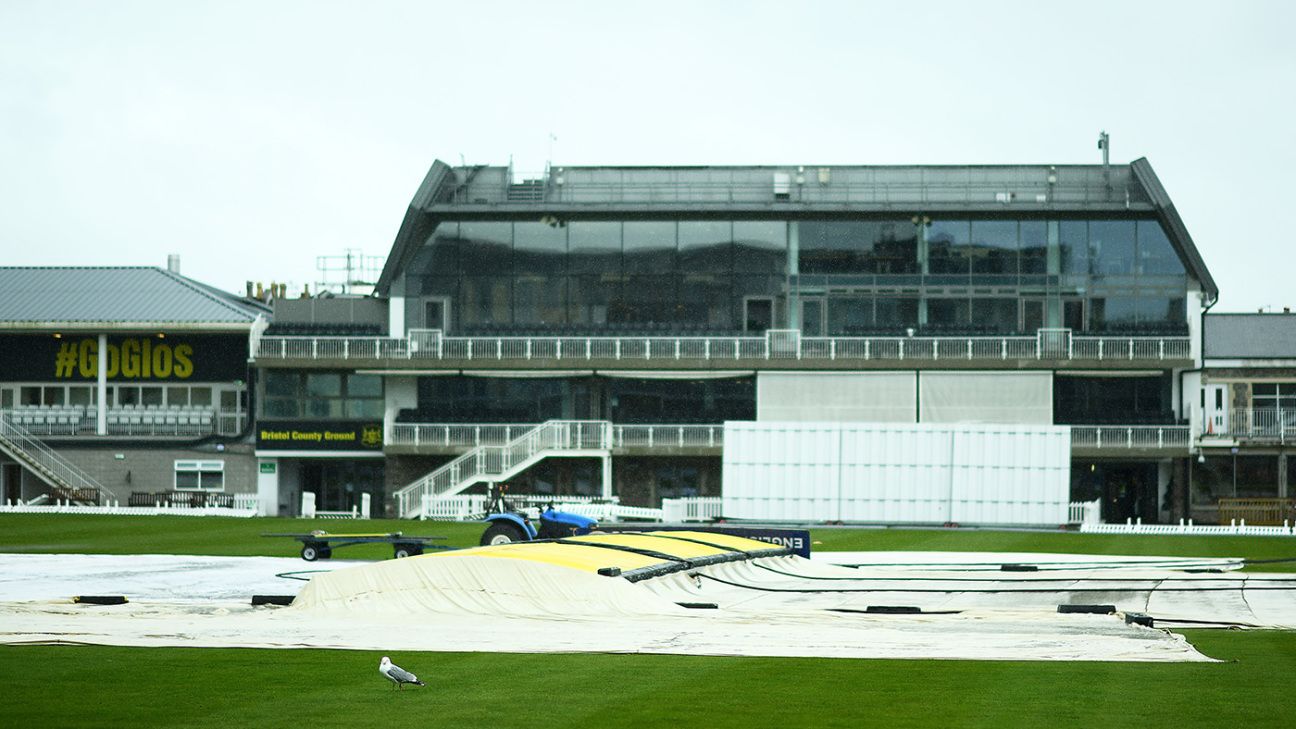No chance of play as covers stay on for day two of West Country derby
Somerset 45 for 1 vs Gloucestershire
James Anderson’s career has been packed with landmarks. The next on the list will surely be reached when the Lancashire bowler dismisses another eight batsmen, thereby joining the select group of cricketers who have bagged over a 1000 first-class wickets in the careers. Well, up to a point, Lord Copper. No one doubts the statistics and few would dispute Anderson’s supreme ability. But the exclusivity of the achievement is open to debate, given that he will be enrolled in a club that currently has 215 members, albeit most are deceased and none are still playing.
Six of them, however, are Gloucestershire spinners and together they form an unbroken line, some might call it a heritage, that stretches across the first three-quarters of the 20th century, when pitches were uncovered during the hours of play and most counties selected two slow bowlers whose relentless interrogation tested the best batsmen in the land. Even the least successful of the six, Reg Sinfield, an offspinning allrounder whose career lasted a mere 16 seasons from 1924 to 1939, took 1173 wickets, 1165 of them for Gloucestershire. But those statistics make him only the 147th most successful bowler in the game’s history.
Sinfield made 15,675 runs to compensate for his under-achievement with the ball and was even selected for a single Ashes match in 1938, when he dismissed the Australian wicketkeeper Ben Barnett in the second innings and a bloke called Bradman in the first. But this was the still the era of Hedley Verity and those four days at Trent Bridge both began and ended Sinfield’s Test career. The selectors decided they needed another seamer at Lord’s and Somerset’s Arthur Wellard was picked for the next game. Mind you, that match was the last Test Wellard would play, too.
These and other researches were the fruit of a very wet morning in Bristol. For you needed to take optimism to the far shore of mania to think we would play cricket at the County Ground on Friday. The morning’s downpour had an implacability about it that reminded one of Democratic Unionists at their least playful. The colours on the satellite chart showing rainfall intensity were so lurid that they will probably be used to publicise the Hundred, an innovation whose promotion has been so clueless that one assumes those in charge of the advertising campaign want the competition to fail.
To most people’s surprise the rain stopped in early afternoon and the umpires announced there would be an inspection at 3pm. At least one journalist hightailed it from his hotel just in time to see the rain return and hear the news that play was abandoned for the day. The teams will try again on Saturday but this match seems certain to be a tussle for valuable bonus points.
And so we returned to the time in which it was not unusual for a slow bowler to take 200 first-class wickets in a season. It was an age in which every county had at least one Test-class slow bowler and most had two. They were considered a necessity rather than a luxury, sometimes on dry pitches but especially when rain had fallen on the surface, making its bounce and turn impossible to predict from the “sticky” earth.
Gloucestershire’s slow left-armer, Charlie Parker, was widely considered the best spinner in the land on a rain-affected pitches and he claimed over 200 victims five times in the decade between 1922 and 1931. “On a sticky wicket Charles Parker, the slow left-hander of Gloucestershire, was the greatest bowler I have seen,” wrote R C Robertson-Glasgow, “for, then, there was no man whom he could not make to look like a child batting with a pencil.”
Parker began his career bowling medium pace but announced in 1919 that he was turning to spin. He ended his career with 3278 wickets, 3170 of them for Gloucestershire. Only Wilfred Rhodes (4204) and “Tich” Freeman (3776) have taken more. They are figures so stratospheric as to point up the fatuity of judging cricketers against others from very different eras. Comparison and contrast may be fruitful but each player’s quality is surely particular to his time.
That said, it is useful to note that Muttiah Muralitharan’s 1374 wickets only places him 102nd on the list of 215 while five of the six Gloucestershire spinners are among the top fifty. They are as follows:
3rd – Charlie Parker (slow left-arm) – 3278 (3170 for Gloucestershire)
5th – Tom Goddard (offspin) – 2979 wickets (2862)
23rd – George Dennett (slow left-arm)2151 (2082)
48th – John Mortimore (offspin) 1807 wickets (1696)
50th – Sam Cook – (slow left-arm) 1782 (1768)
Those figures in brackets are revealing, too. Whereas the vast majority of Anderson and Muralitharan’s wickets were taken playing for their countries all five Gloucestershire cricketers had to battle even to get into the England side. Mortimore played nine Tests, Goddard eight, Sinfield, Parker and Cook one each, Dennett none at all. Before anyone rushes to judgement it might be useful to recall that in addition to Rhodes, Dennett had to compete against Colin Blythe, Parker and Goddard were fighting for a place with Verity, and Mortimore’s best years coincided with those of first Jim Laker and then Fred Titmus and Ray Illingworth. We have barely touched on some of the issues involved in these debates and some fine bowlers have not even been mentioned. (There is a good case that Parker, in particular, was badly treated.) But on a wet Friday in Bristol it is worth reflecting on the eras when there might be 20 spinners competing for an England place instead of half a dozen as there are today.
Paul Edwards is a freelance cricket writer. He has written for the Times, ESPNcricinfo, Wisden, Southport Visiter and other publications
